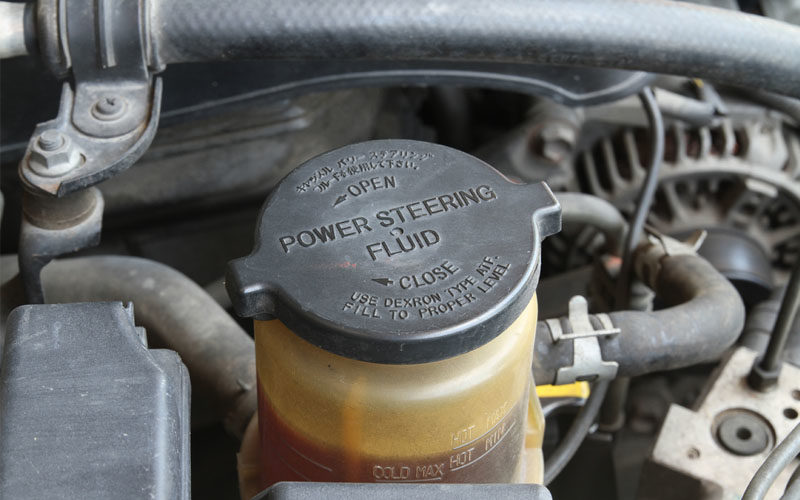One of the ways to keep your car in good running condition is to maintain its essential fluids. Vehicles have a lot of moving parts, some of which you need to have checked and serviced with regular tune-ups. Keeping your car’s essential fluids topped off and in good working order is an inexpensive car maintenance task that you can either do yourself or through a professional. It is also something that will prevent premature engine wear and damage to your vehicle. Here are the seven fluids that are important to keep your car running in top shape.
Oil
The oil in your car keeps your engine’s parts lubricated, and this fluid isn’t something that you want to run dry. Checking your vehicle’s oil is easy — and essential. After driving the car, let it cool down for about five minutes. Lift your car’s hood and locate the dipstick. Pull it out and wipe it clean with a rag. Now, reinsert the dipstick completely and then pull it out. Look at the oil level against the indicator notches that tell you whether or not you have the right levels. If not, read your car’s owner’s manual for directions on the type of oil to add. Regular oil changes should occur according to your particular vehicle’s specifications.
Radiator Fluid
If you don’t want your engine to overheat, you should make sure that your car isn’t short on radiator fluid. You should check this fluid after you’ve driven your car, not when it’s sitting cold. However, don’t remove the radiator cap when the car is hot, or the engine is running. Open the cap carefully using a rag and look down into the radiator for visible coolant. If you don’t see any, add some.
Transmission Fluid
Transmission fluid is the magic ingredient that keeps your vehicle’s transmission lubricated. Some cars have a dipstick to check this, while it needs to be professionally checked in others. If you have a dipstick, check this one the same way that you test the oil. Most transmission fluids never need to be replaced, so you would only need to check this for issues, generally about every three years. You might have a problem if the fluid looks cloudy or is gritty to the touch.
Power Steering Fluid
Power steering makes the handling of your vehicle smoother and effortless at any speed. Yet, that system needs fluid to operate. There is also either a dipstick under your hood or a reservoir in your engine bay to check your power steering fluid. If you have a dipstick, you can check your fluid the same way that you check oil. Otherwise, ask a professional to do the check — about every two years — and top off the fluid if needed.
Brake Fluid
All vehicles have a brake line system which is a sealed network that controls your car’s ability to stop. When you step on your vehicle’s brake, the system’s brake fluid compresses, which forces pressure on the brake pads. Brake fluid can leak and deplete, so it’s important that this is checked periodically. Your mechanic can check your brake fluid, at least once per year, and its appearance should be translucent, never dark or cloudy.
Air Conditioner Fluid
As the temperatures begin to warm up, you want to make sure that your car’s air is going to keep you cool during the summer months. Air conditioner fluid is also referred to as freon or refrigerant. This is a complicated DIY check, so this is something that you should ask your mechanic to look at annually.
Washer Fluid
Not only is your car’s washer fluid important to your driving safety, but it’s also probably one of the easiest things to check and maintain under the hood. You can purchase a jug of wiper fluid at a gas station, grocery store, or drug store and you just pour the fluid into your vehicle’s washer reservoir until it’s full.
You can keep your car running smoothly and help prevent some costly repairs simply by checking these essential fluids. Vehicles vary, so how often you do these periodic checks may depend on the make and model of your car as well as your level of use. Many of these fluid checks are simple tasks that can be completed in your driveway and are used car maintenance habits that will keep your vehicle running smoothly for many miles to come.





![The Importance of Preventative Maintenance [video]](https://www.integrityautofinance.com/wp-content/uploads/2022/05/importance-regular-maintenance-2022-450x189.jpg)






Rosie Hill
I agree that used vehicle needs comparatively more maintenance. Regular maintenance is the key to keep the vehicle in working order. Many people often ignore the importance of regular maintenance of the vehicle which could have catastrophic effects on the performance of the vehicle. So, the condition of different types of fluids used in the vehicle should be inspected regularly and if necessary should be replaced with suitable substitutes.
Daisy Renn
Many people often ignore the importance of different types of fluids used in the vehicle including the coolant. Lubricants, as well as coolant, plays a critical role in the performance of the vehicle by reducing friction among different components of the vehicle. Lack of an adequate amount of lubricant could affect the performance of the vehicle in a very adverse way. So, the condition of different types of lubricants used in the vehicle should be inspected regularly and burnt lubricants should be replaced with suitable substitutes. A car needs preventive maintenance to run smoothly without any major mechanical abnormalities.
Julie Parsons
Definitely, a used car needs special attention to run smoothly without any major mechanical abnormalities. Skipping the routine maintenance schedule could have disastrous outcomes. A car is nothing but a machine and hence needs special attention to last long. Burnt lubricants could not lubricate different components of the vehicle efficiently. So, the quality of the lubricants, as well as other fluids used in the vehicle, should be inspected regularly and burnt lubricants should be replaced with suitable substitutes to keep the vehicle in working order.